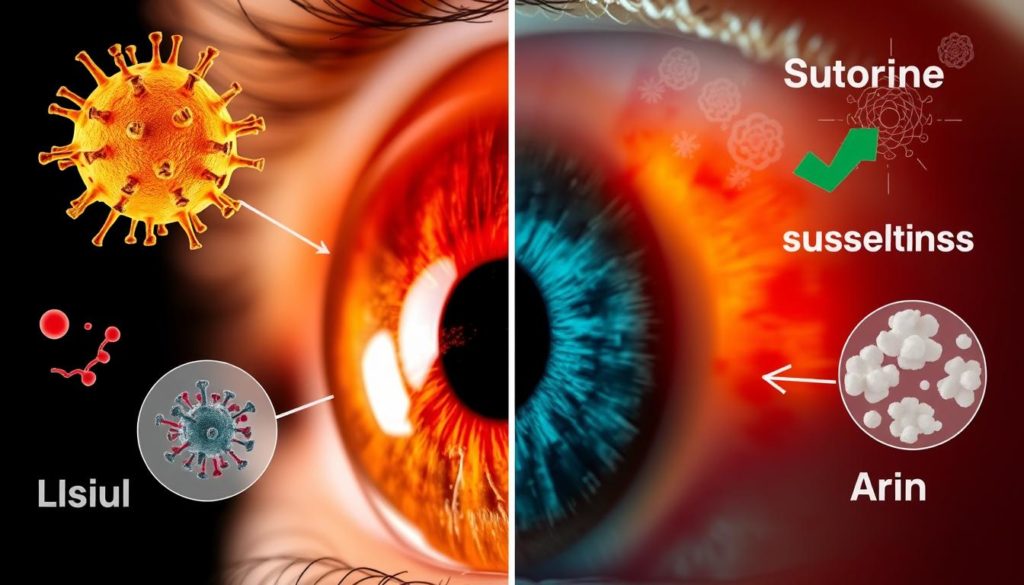“The only thing we have to fear is fear itself.” – Franklin D. Roosevelt
Uveitis is more than just an eye condition; it’s a complex journey. It requires comprehensive care and personalized therapy. With many uveitis treatment options available, it’s crucial to choose wisely.
We will explore different healing approaches. This includes traditional medications and advanced treatments. Our goal is to empower patients to make informed decisions about their uveitis therapy.
Understanding Uveitis: Causes and Symptoms
Uveitis is an inflammation of the uvea, the middle layer of the eye. It often affects the iris, ciliary body, and choroid. This leads to various eye problems. Knowing the causes and symptoms of uveitis is key to managing it.

What is Uveitis?
Uveitis is an inflammation in the uvea, which includes the iris, ciliary body, and choroid. It can happen in one or both eyes and affects people of all ages. Early treatment is crucial to avoid vision damage.
Common Symptoms of Uveitis
Spotting uveitis symptoms early is vital. Symptoms can vary and may include:
- Redness in the eye
- Pain in the ocular area
- Blurred vision
- Sensitivity to light
- Floaters or spots in the vision
These symptoms can appear quickly or slowly. Regular eye exams are important for early detection and treatment.
Causes and Risk Factors
Uveitis can be caused by many factors. These include:
- Autoimmune disorders like rheumatoid arthritis or sarcoidosis
- Infections like herpes simplex, toxoplasmosis, and tuberculosis
- Exposure to toxins and injury to the eye
Genetic markers and systemic diseases can also raise the risk of uveitis. Knowing these risks helps in early and effective treatment.
Medications for Uveitis Management

Managing uveitis often needs a mix of different medicines. Each medicine has its own job in fighting symptoms and stopping more problems.
Corticosteroids
Corticosteroids are key for fighting inflammation in uveitis. They can be taken by mouth, applied to the eye, or given as injections. But, they can cause side effects like high eye pressure and cataracts, so they must be used carefully.
Immunosuppressive Drugs
For serious uveitis, doctors might use immunosuppressive therapy. These drugs help control the immune system and lessen inflammation. But, they need to be watched closely because they can cause problems like infections and liver damage.
Non-Steroidal Anti-Inflammatory Drugs (NSAIDs)
NSAIDs are sometimes used for milder inflammation in uveitis. They are not as strong as corticosteroids or immunosuppressants but have fewer side effects. This makes them a good choice for long-term treatment in some cases.
| Medication Type | Administration Route | Primary Use | Possible Side Effects |
|---|---|---|---|
| Corticosteroids | Oral, Topical, Injection | Severe Inflammation | Increased Intraocular Pressure, Cataracts |
| Immunosuppressive Drugs | Oral, Injection | Autoimmune Uveitis | Infection Risk, Liver Toxicity |
| NSAIDs | Oral | Mild Inflammation | Gastrointestinal Issues |
Advanced Uveitis Treatment Options
Uveitis research has made big strides. Now, there are more advanced treatments for patients.
Biologic Agents
Biologic agents for uveitis are new and exciting. They target specific parts of the inflammatory process. These medicines can calm down the immune system, helping those who didn’t get better with usual treatments.
Monoclonal Antibodies
Monoclonal antibodies are a hopeful treatment for uveitis. They are made to attach to certain proteins or cells in the immune system. This helps control inflammation better. They work well for some types of uveitis, offering a focused treatment.
Intravitreal Injections
Intravitreal injections are for severe or hard-to-treat cases. They put medicine right into the eye. This method gets the drug to the inflammation site fast, giving better results. These injections can use corticosteroids or other anti-inflammatory drugs, depending on the patient’s needs.
Role of Uveitis Specialists and Treatment Centers
Finding the right care for uveitis is key to managing it well. Uveitis specialists have the needed expertise to handle this complex condition. They ensure patients get a detailed evaluation and a treatment plan that fits their needs.
Finding the Right Uveitis Specialist
Choosing the right uveitis specialist is crucial. Look at their credentials, experience, and treatment approach. It’s best to find specialists at top uveitis treatment centers. They offer the latest treatments and research.
Top Uveitis Treatment Centers in the U.S.
The U.S. has many top uveitis treatment centers. These centers use the latest treatments and have dedicated teams. Here’s a look at some of the best centers.
| Center Name | Location | Specialized Programs | Contact Information |
|---|---|---|---|
| Wilmer Eye Institute | Baltimore, MD | Comprehensive Uveitis Care | (410) 955-5080 |
| Massachusetts Eye and Ear | Boston, MA | Advanced Uveitis Research | (617) 573-3202 |
| Baylor College of Medicine | Houston, TX | Immunomodulatory Therapy | (713) 798-6100 |
| University of California, San Francisco | San Francisco, CA | Team of Leading Specialists | (415) 476-1000 |
The Importance of Specialized Care
Specialized care is crucial for uveitis due to its complexity. Uveitis specialists provide focused care that can greatly improve outcomes. They help reduce complications and improve patients’ quality of life. Personalized treatment plans from experts at uveitis centers ensure a comprehensive approach to managing this challenging disease.
Natural Remedies and Holistic Approaches
Using natural remedies and holistic methods is key in managing uveitis. Traditional medicine is important, but many are looking for natural ways to feel better. Holistic uveitis approaches are becoming more popular.
Dietary Changes
Changing your diet can greatly improve your eye health. Eating foods that fight inflammation, like leafy greens and berries, is helpful. Also, cutting down on processed foods and sugar is good.
Herbal Supplements
Herbal supplements are being seen as uveitis natural remedies. Turmeric, with its curcumin, is very anti-inflammatory. Omega-3 fatty acids in fish oil also help. Always talk to a doctor before trying new supplements.
Lifestyle Adjustments
Making lifestyle changes is a big part of holistic uveitis approaches. Reducing stress with yoga or meditation helps. Getting enough sleep and keeping a healthy weight are also important for your eyes.
Here’s a look at some dietary changes and their benefits:
| Food Type | Benefits |
|---|---|
| Leafy Greens | Rich in Vitamins A and C, reduce inflammation |
| Fatty Fish | High in Omega-3 fatty acids, combats inflammation |
| Berries | Loaded with antioxidants, support eye health |
Uveitis-Specific Therapies and Interventions
In recent years, new uveitis interventions have emerged. These offer more customized uveitis therapy options. Each type of uveitis—such as anterior, intermediate, posterior, or panuveitis—gets its own special treatment.
The aim is to find effective uveitis remedies with fewer side effects. This way, patients can see better results. Healthcare providers tailor treatments based on each patient’s unique situation.
Here are some of the latest uveitis interventions and their specific uses:
| Therapy | Indication | Benefits |
|---|---|---|
| Intravitreal Steroid Implants | Posterior Uveitis | Reduces inflammation over extended periods |
| Biologic Agents | Refractory Uveitis | Targets specific immune pathways |
| Laser Photocoagulation | Intermediate Uveitis | Controls retinal complications |
| Systemic Immunosuppressants | Panuveitis | Reduces immune system activity |
Every customized uveitis therapy needs a careful look at the patient’s situation and diagnosis. Working with a specialist is key. This ensures the best treatment for each patient’s needs.
Surgical Options for Severe Cases
When severe uveitis doesn’t respond to usual treatments, surgery is needed. It helps manage the condition and prevent more problems.
Vitrectomy
Vitrectomy for uveitis is a common surgery. It removes the vitreous gel to lessen inflammation and help reach the retina. This surgery is helpful when other treatments don’t work.
Retinal Surgery
Retinal surgery is key for those with uveitis-related retinal issues. It fixes retinal tears and reattaches the retina. This improves vision and quality of life for those with severe uveitis.
Laser Therapy
Laser therapy for uveitis is a cutting-edge treatment. It’s great for dealing with issues caused by long-term inflammation. It targets abnormal blood vessels, preventing more damage and keeping the eye healthy.
Here’s a quick look at these surgeries, what they do, and their benefits:
| Surgical Option | Purpose | Benefits |
|---|---|---|
| Vitrectomy | Remove vitreous gel to reduce inflammation | Improves access to retina, reduces inflammation |
| Retinal Surgery | Fix complications like retinal detachment | Restores vision, prevents further issues |
| Laser Therapy | Target complications like neovascularization | Prevents further eye damage, maintains ocular health |
Managing Uveitis During Pregnancy
Uveitis during pregnancy is a big challenge because it can harm both the mother and the baby. It’s important to know the risks and how to handle them. Healthcare experts must carefully assess the situation to protect both the mother and the baby.
Risks and Considerations
Uveitis in pregnancy can lead to serious problems. Hormonal changes can make symptoms worse, needing different treatments. It’s also key to pick safe medicines to avoid harming the fetus. Specialists must closely watch the condition to keep risks low.
Safe Treatment Options
Safe treatments for uveitis in pregnancy include medicines and therapies that are safe for both. Corticosteroids might be used in lower doses or as eye drops to avoid too much absorption. NSAIDs might be limited because of their effects on the fetus. Sometimes, drugs that suppress the immune system are considered if the benefits are greater than the risks. Always talk to a doctor before trying herbal supplements or changing your diet.
FAQ
What is Uveitis?
Uveitis is an inflammation of the uvea, the middle layer of the eye. It can cause eye redness, pain, blurred vision, and sensitivity to light. Proper management is key to keeping your eyes healthy and preventing complications.
What are the common symptoms of Uveitis?
Symptoms include eye redness, pain, blurred vision, and light sensitivity. Sometimes, you might see floaters. If you notice these signs, seek care right away.
What causes Uveitis?
Uveitis can be caused by autoimmune disorders, infections, or toxins. Knowing the causes and risk factors helps in managing the condition and finding the right treatment.
What medications are used for Uveitis management?
Treatments include corticosteroids, immunosuppressive drugs, and NSAIDs. These medications help reduce inflammation and manage the condition.
Are there advanced treatment options for Uveitis?
Yes, advanced treatments include biologic agents, monoclonal antibodies, and intravitreal injections. These therapies offer new ways to manage uveitis effectively.
How can I find the right Uveitis specialist?
Look for uveitis treatment centers and professionals with expertise. Specialized care is crucial for effective treatment plans.
Are there natural remedies and holistic approaches for Uveitis?
Yes, natural remedies and holistic approaches include dietary changes, herbal supplements, and lifestyle adjustments. These can help alongside traditional treatments and improve eye health.
What surgical options are available for severe Uveitis?
Surgical options include vitrectomy, retinal surgery, and laser therapy. These are considered when other treatments fail.
How is Uveitis managed during pregnancy?
Managing uveitis during pregnancy requires careful planning. It’s important to balance risks and choose safe treatments. Close monitoring by healthcare professionals is essential for the mother and the developing fetus.


